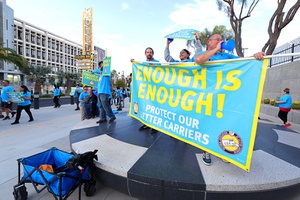Chats
Transcript of reader chat with Sun health reporter Marshall Allen
June 30, 2010

Sun health reporter Marshall Allen answered questions from readers Wednesday about his investigation into hospital care in Nevada. The following is the transcript of the chat.
moderator
Yesterday on KNPR's "State of Nevada" a hospital official asked you why you didn't focus on all the good things the hospitals are doing in your report. Why are you focusing on such negative things?
Marshall Allen
My assignment was to find what's good and what's bad about health care in Nevada. Pretty broad, right? As I examined things, I wanted to get beyond all the anecdotal stuff we hear about health care here. There are plenty of horror stories, but I wanted to see if we could quantify things in a meaningful way. We discovered this inpatient hospital database, and the results of that analysis have dictated the scope of the project so far.
Unfortunately, while there are many great doctors and nurses and providers here, Las Vegas hospital care does not compare favorably by many metrics to health care elsewhere. It's hard to make an apples to apples comparison, but the info that does exist does not make us look good.
Marshall Allen
Also, I believe it's important to focus on reality and tell the truth -- whether that makes things look good or bad. I'm looking at things from a patient-centric point of view, as well, and the patients are the ones who are usually left out of this equation. They're powerless, and in many cases their considerations are not taken into account.
Marshall Allen
I will add that I've done many positive stories about health care here. I've focused on the Volunteers in Medicine clinic, for instance, or what's happening at the Cleveland Clinic Lou Ruvo Center for Brain Health. When things are really positive, and newsworthy, I am happy to report on them.
moderator
What type of feedback are you hearing from readers?
Marshall Allen
Tons of phone calls and emails -- maybe 100 so far in the first few days. People are desperate for someone to listen to their stories. They're angry. Distrustful of hospital care, and pleased that the Sun has done this investigation. Their stories are tragic and disturbing.
moderator
Why hasn't anyone else paid attention to this data?
Marshall Allen
The state is conducting its own analysis of the data, as a result of legislation passed in 2007. So you could say it's taken them a while --due to budget cuts.
The hospital lobbyists have been protesting that the state cannot release its results by individual hospital, as we did. they said the events were protected by sentinel events legislation passed in 2002.
In other ways the state has done almost no analysis of this data, whcih has been collected since 1986. We'll be delving deeper into it in future installments of this project.
vicky73
how do we compare to other hospitals throughout the united states?
Marshall Allen
It's hard to compare to other hospitals -- at least with the type of harmful incidents we identified in part one of this project. Everyone keeps different types and formats of data, with various levels of public release of the information. Really, consumers don't have good info about these type of harmful events.
The real comparison should be to zero. The proper number of these preventable events is zero. They should not be happening, and they are preventable. the fact that teh data showed 969 of them in Vegas hospitals in 2008-2009 is troubling, no matter how many happened elsewhere.
ewl
Isn't managed care responsible for assuring compliance with the quality issues you raise? Has there been any reaction?
Marshall Allen
In my reporting I've found that hospitals and others are often making the comparison to each other, when what they should be doing is refusing to tolerate any type of harm to patients. A sort of normalized deviance sets in, where people become complacent to falls, injuries, infections, bedsores and that type of thing, because they think they just are a normal part of healthcare. That's not the right mindset and something that needs to be changed.
JenniferBannan
I represent a company that makes RFID-based systems to prevent retained surgical sponges. This is a problem that needs to go away. LV hospitals could benefit from knowing about this tech!
Marshall Allen
I think all the stakeholders bear some responsibility for these problems, including managed care and other payers. The insurance companies have to balance pushing for quality with making sure the people they cover have providers who will work with them to provide care. It can be a delicate balance, but I have not heard of insurance companies pushing for quality until recently, a few months ago, when the Health Services Coalition issued an RFP that included some quailty demands.
Marshall Allen
Also, hospitals and doctors here often complain about extremely low reimbursements from insurance companies here, in part because Sierra/United have had such a monopoly on the market. So they increase volume to make their money.
I have tried to verify that the reimbursements here are actually lower than other places, but this is proprietary info and extremely hard to verify. but it's commonly said that the payments by insurance companies are very low here.
ewl
Aren't consumers pretty limited in knowing what procedures can most safely done in Las Vegas hospitals? Do we do enough open heart surgery and nerve sparing prostate surgery for example when you compare the results from surrounding states and across the country?
Marshall Allen
Hey there, Jennifer -- sounds like some good technology! You'll have to contact the hospitals and pitch it to them. Using our findings, at least you can see which hospitals have reported such events in their inpatient data.
Marshall Allen
ewl -- consumers are extremely limited when it comes to knowing which procedures can be safely done here. One truism is that volume usually dictates quality for the more complex procedures. This data can be analyzed to show the number of procedures being done in each facility. We hope to get to that -- but there are many more pressing things to report first.
want2know
Is there anything the state of NV or legislators can do to enforce the hospitals to report sentinel events? Will the hospitals be penalized or fined for not doing the required paperwork?
Marshall Allen
Yes, the state regulators have said they will be reviewing the actual medical records for the events that we have identified as a result of our investigation. this is what really needs to be done: audit the charts to see if they have been underreporting.
The hospitals can be penalized and fined for any unreported sentinel events, up to $100 for every day they went unreported, for any event after mid-2009. Those fines could add up if our investigation is accurate. But again, we have to emphasize that these are their self-reported inpatient records, and they're based on billing codes. We don't have the medical charts, and that's what needs to be reviewed.
moderator
Why are hospitals so reluctant to give people this information?
Marshall Allen
They say it's for liability reasons, and also because it could create a "culture of fear," where hospital employees and doctors would be afraid to report anything because it could become known.
Others say it's flat out because of money. this is a competitive business and they need to draw patients to their facilities. If it was known how many times their patients were injured and harmed, it might cause patients to go elsewhere.
What's unfortunate is that I have yet to hear a Las Vegas hospital take pride in pronouncing that patients come first -- and that means they're going to disclose these preventable incidents of harm and strive to improve and eliminate them. there's a great opportunity for the Las VEgas hospital that wants to stand out in the market by staffing up, establishing best practices, and refusing to tolerate anything less than the best. So far none have taken it.
want2know
How did you get the people for your you story? Did they contact you or did you find out about their stories through court records? Regardless, very say situations.
Marshall Allen
By the way, by "stepping up," I mean that they need to be transparent with the public.
Marshall Allen
I often have people contact me with horror stories about health care, and so some I track that way. People have nowhere else to turn in some cases.
I got other cases from court records. And I also have medical providers contact me at times -- not in a way that discloses anything private. But I have many insiders who let me know when things go wrong.
This is another indication that there is a breakdown with the regulatory system. People who come to me have tried to go elsewhere, and they have not had any justice done.
moderator
What's next in your series of stories?
Marshall Allen
I can't be specific yet, but we'll be presenting stories that will have the maximum relevance for the community. This data is incredibly revealing and it's a shame that people have not had access to it before now.
We certainly appreciate the feedback we've received, and I encourage patients, doctors, nurses, hospital executives and anyone else who is interested to call me at 259-2330. This is an ongoing process and will be one of the Sun's main focuses in 2010.
Most Popular
-
1
-
2
-
3
-
4
-
5







Connect with Us